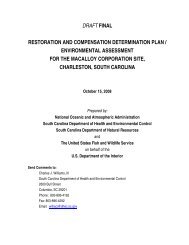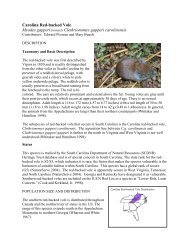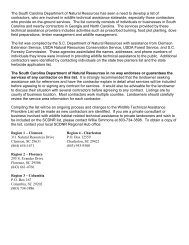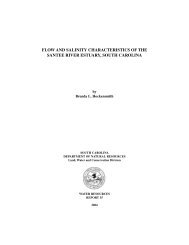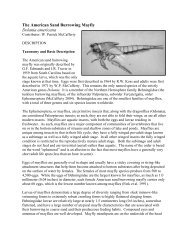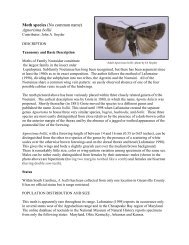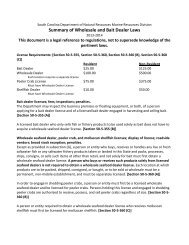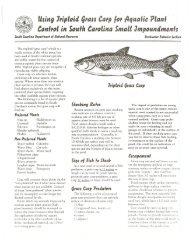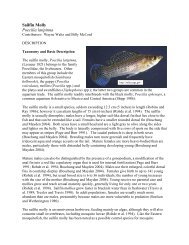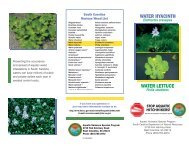Pond Management - South Carolina Department of Natural Resources
Pond Management - South Carolina Department of Natural Resources
Pond Management - South Carolina Department of Natural Resources
You also want an ePaper? Increase the reach of your titles
YUMPU automatically turns print PDFs into web optimized ePapers that Google loves.
Miscellaneous Problems and Considerations<br />
Fish Mortality<br />
Most fish mortalities occur in <strong>South</strong> <strong>Carolina</strong> as a result <strong>of</strong><br />
dissolved oxygen depletion, pesticide toxicity, or parasite and<br />
disease damages.<br />
Oxygen depletion is by far the most common cause <strong>of</strong> fish kills<br />
in ponds. They can be largely prevented by good management<br />
practices, but will occasionally occur in even the best managed<br />
ponds. Although conditions are most favorable in the summer and<br />
early fall for low oxygen problems, generally these events are not<br />
predictable or wholly preventable by the average pond owner.<br />
Some <strong>of</strong> the most common causes <strong>of</strong> DO depletion are:<br />
• “Turnover” - Remember that ponds stratify during the<br />
summer and the lower layer <strong>of</strong> water contains little or no<br />
DO. A sudden cold front, heavy rain or even strong winds<br />
can physically mix the water in the pond, or overturn it.<br />
This mixing <strong>of</strong> the water column results in DO levels too<br />
low for fish to survive. If the previous few days have had<br />
little sunshine, the effect will be worse, since oxygen levels<br />
in the upper layer are likely to be lower initially.<br />
• Over fertilization - Excessive fertilization can produce<br />
excessively dense blooms <strong>of</strong> phytoplankton or undesirable<br />
alga problems. These produce oxygen on sunny days, but<br />
very heavy blooms will utilize nearly all <strong>of</strong> that oxygen<br />
during the night, leaving very little for fish respiration.<br />
• Aquatic vegetation or algae die-<strong>of</strong>f - Sometimes a heavy<br />
phytoplankton bloom or infestation <strong>of</strong> aquatic weeds in a<br />
pond will die <strong>of</strong>f naturally or as a response to herbicidal<br />
treatment. As the plants decompose, oxygen is consumed<br />
and DO levels may fall to a level lethal to fish.<br />
Symptoms <strong>of</strong> DO depletion may include fish gulping at the surface<br />
<strong>of</strong> the water. This is especially noticeable early in the morning<br />
when oxygen levels are likely to be lowest or fish congregate near<br />
22



